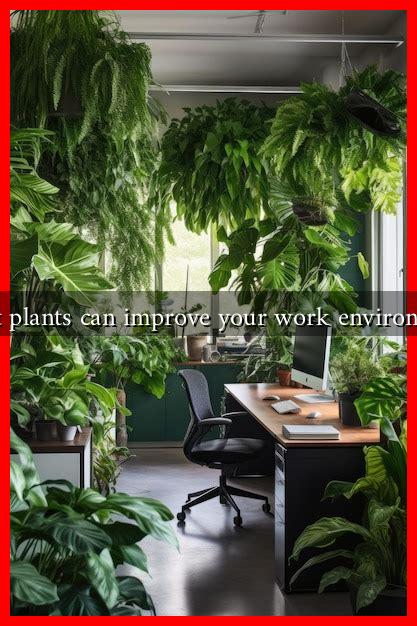-
Table of Contents
- What Plants Can Improve Your Work Environment
- The Benefits of Plants in the Workplace
- Top Plants to Enhance Your Work Environment
- 1. Snake Plant (Sansevieria)
- 2. Peace Lily (Spathiphyllum)
- 3. Pothos (Epipremnum aureum)
- 4. Spider Plant (Chlorophytum comosum)
- 5. ZZ Plant (Zamioculcas zamiifolia)
- Case Studies and Statistics
- Conclusion
What Plants Can Improve Your Work Environment
In today’s fast-paced work environment, the importance of creating a conducive atmosphere for productivity cannot be overstated. One effective way to enhance your workspace is by incorporating plants. Not only do they add aesthetic value, but they also offer numerous psychological and physiological benefits. This article explores various plants that can improve your work environment, backed by research and statistics.
The Benefits of Plants in the Workplace
Plants have been shown to positively impact employee well-being and productivity. Here are some key benefits:
- Improved Air Quality: Plants can filter toxins and improve indoor air quality. According to a study by NASA, certain plants can remove up to 87% of indoor air pollutants in 24 hours.
- Enhanced Mood: Exposure to greenery can reduce stress and anxiety levels. A study published in the Journal of Environmental Psychology found that individuals working in environments with plants reported higher levels of satisfaction and lower levels of stress.
- Increased Productivity: Research from the University of Exeter found that employees working in environments with plants were 15% more productive than those in sterile settings.
Top Plants to Enhance Your Work Environment
Here are some of the best plants to consider for your workspace:
1. Snake Plant (Sansevieria)
The snake plant is a hardy plant that thrives in low light and requires minimal care. It is known for its air-purifying qualities, making it an excellent choice for offices. Additionally, it releases oxygen at night, which can improve air quality while you work.
2. Peace Lily (Spathiphyllum)
Peace lilies are not only beautiful but also effective at removing harmful toxins like ammonia and benzene from the air. They thrive in low light and only need watering when the soil feels dry. Their ability to bloom indoors adds a touch of elegance to any workspace.
3. Pothos (Epipremnum aureum)
Pothos is a versatile plant that can grow in various lighting conditions. It is known for its ability to purify the air and is particularly effective at removing formaldehyde. Its trailing vines can be used to create a green wall or drape over shelves, adding a natural aesthetic to your office.
4. Spider Plant (Chlorophytum comosum)
The spider plant is another low-maintenance option that thrives in indirect sunlight. It is known for its ability to absorb carbon monoxide and other toxins, making it a great air purifier. Plus, its unique appearance adds visual interest to your workspace.
5. ZZ Plant (Zamioculcas zamiifolia)
The ZZ plant is perfect for those who may not have a green thumb. It can survive in low light and requires infrequent watering. This plant is also known for its ability to tolerate neglect while still providing air-purifying benefits.
Case Studies and Statistics
Several organizations have implemented biophilic design principles, incorporating plants into their workspaces with remarkable results:
- Google: The tech giant has integrated plants into its offices, leading to increased employee satisfaction and productivity.
- Wells Fargo: A study conducted in their offices showed a 20% increase in employee productivity after introducing plants into the workspace.
- University of Queensland: Research found that employees in plant-rich environments reported a 37% reduction in stress levels.
Conclusion
Incorporating plants into your work environment is a simple yet effective way to enhance productivity, improve air quality, and boost employee morale. From the snake plant to the peace lily, there are numerous options to suit any workspace. As research continues to support the benefits of greenery in the workplace, it becomes increasingly clear that investing in plants is not just an aesthetic choice but a strategic one. By creating a greener workspace, you can foster a healthier, more productive environment for yourself and your colleagues.
For more information on the benefits of plants in the workplace, you can visit NCBI.

